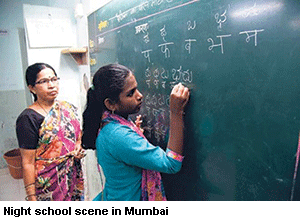Maharashtra: Night schools blow
 Maharashtra’s night schools, which run evening classes to provide classes V-XII state board education for economically weaker sections of society (irrespective of age and gender) unable to attend day schools, are facing an acute shortage of teachers since the beginning of the current academic year (2017-18). That’s because a government resolution (GR) dated May 17 has barred secondary (classes V-X) teachers of government schools from doubling as night school teachers leading to the debarring of 1,358 night school teaching and non-teaching staff (headmaster, clerk, peon etc).
Maharashtra’s night schools, which run evening classes to provide classes V-XII state board education for economically weaker sections of society (irrespective of age and gender) unable to attend day schools, are facing an acute shortage of teachers since the beginning of the current academic year (2017-18). That’s because a government resolution (GR) dated May 17 has barred secondary (classes V-X) teachers of government schools from doubling as night school teachers leading to the debarring of 1,358 night school teaching and non-teaching staff (headmaster, clerk, peon etc).
The state’s education ministry planned to replace the night school teachers with its surplus teachers in empty government schools. However, four months into the academic year, these surplus teachers have not been redeployed and 32,000 night school students across the state are forced to do without teachers and/or manage with a single teacher for all subjects. Disgruntled students from Mumbai’s night schools have now approached the Bombay high court asking for a stay on the May 17 GR until the time the government is able to deploy the required number of teachers.
Across Maharashtra (pop. 114 million), 176 night schools offer three hours of evening tuition in English and four vernacular languages (Marathi, Kannada, Gujarati, Urdu) free of charge to students. Functioning out of municipal or local self-government run day schools, evening (aka night) schools managed by educational trusts, most of which are set up by teachers, receive government aid towards salaries of teaching and non-teaching staff subject to their having a minimum of 100 students. The remuneration of night school teachers is half that of day school teachers and government data shows 1,358 teachers were teaching in day as well as night schools with 596 teachers working exclusively in night schools.
After issuing the May 17 GR, which in effect discontinues the second salary paid to day school teachers, the state government is likely to save Rs.34.5 crore per year. It will also gainfully employ teachers from its pool of 3,500 surplus teachers on whom it spends Rs.150 crore without providing any work for them. In all, Maharashtra spends a whopping 69 percent of its education budget (Rs.48,845 crore for 2017-18) towards teachers’ salaries.
“While the government should save money where it can, officials should have had a plan in hand before barring dual teachers. Thus far, they have managed to reallocate only 20 percent of the surplus teaching and non-teaching staff and in most cases the teacher posted to a vernacular medium school is not suitable, as she is not sufficiently familiar with the language,” says Meenal Vagal, treasurer of the Marathi-medium Utkarsha Night School in Worli run by the Shikshan Premi Mandal, founded by her father in 1970.
Inevitably, state government officials refute all charges of appointing unqualified teachers in night schools. “No step-motherly treatment is meted out to night schools as substitute teachers are well-qualified to teach. Schools are rejecting these teachers on flimsy grounds out of sheer selfishness of dual teachers who want to keep both jobs for themselves. In fact, in June, the Bombay high court rejected a petition filed by night school teachers against the GR and upheld the government’s action,” says Nand Kumar, education secretary of the Maharashtra government.
Being free-of-charge institutions Maharashtra’s night schools, funded by middle-class philanthropists and partly by the state government, are vulnerable to government policies unlike the night schools of Goa and Meghalaya, which are fully funded by Christian missionaries. Established to school Maharashtra’s migrant labour and marginalised sections of society, night schools are the only hope of basic literacy for millions of migrant workers who stream into India’s most industrialised state to work in the construction and informal sectors of the economy.
Thus far, night schools have been running solely on the passion of teachers who go beyond the call of duty to bring drop-out students back to school. Despite the latest government diktat, several teachers continue to teach knowing fully well that they won’t be paid for it. “We are all aware of the quality of education in the state. 12.4 percent of children drop out of government schools every year and 35 municipal schools in Mumbai have been shut down mainly due to continuous flight of students to private budget schools. If night schools lose the committed day school teachers who are their strength, there will be little incentive for students to attend them. It’s a shame that to save a small sum, the state government is depriving the most marginalised members of society a modicum of education,” says Anil Patil, headmaster, Samarth Ramdas Night School, Mumbai.
Pennywise, pound foolish
Dipta Joshi, (Mumbai)















Add comment